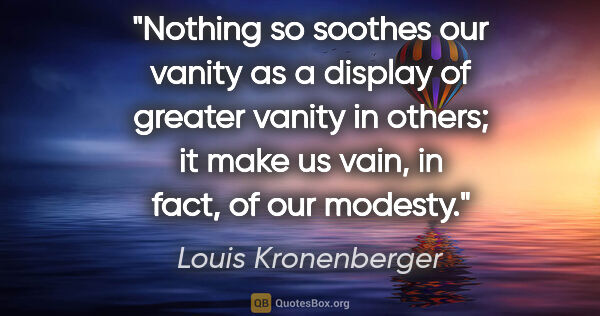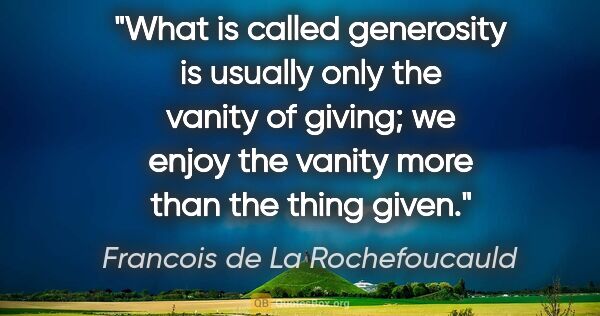Vanity Quotes (page 2)
The vanity of the passing world and love are the two fundamental and heart-penetrating notes of true poetry. And they are two notes of which neither can be sounded without causing the other to vibrate. The feeling of the vanity of the passing world kindles love in us, the only thing that triumphs over the vain and transitory, the only thing that fills life again and eternalizes it.
Miguel de Unamuno
How despicably I have acted!" she cried; "I, who have prided myself on my discernment! I, who have valued myself on my abilities! who have often disdained the generous candour of my sister, and gratified my vanity in useless or blameable mistrust! How humiliating is this discovery! Yet, how just a humiliation! Had I been in love, I could not have been more wretchedly blind. But vanity, not love, has been my folly. Pleased with the preference of one, and offended by the neglect of the other,...
Jane Austen
From that awful encounter of the soul with the outer world, enunciation, wisdom, and charity are born; and with their birth a new life begins. To take into the inmost shrine of the soul the irresistible forces whose puppets we seem to be - Death and change, the irrevocableness of the past, and the powerlessness of Man before the blind hurry of the universe from vanity to vanity - to feel these things and know them is to conquer them.
Bertrand Russell
The world had made him extravagant and vain - Extravagance and vanity had made him cold-hearted and selfish. Vanity, while seeking its own guilty triumph at the expense of another, had involved him in a real attachment, which extravagance, or at least its offspring, necessity, had required to be sacrificed. Each faulty propensity in leading him to evil, had led him likewise to punishment.
Jane Austen
Margie had known many men, most of them guilty, wounded in their vanity, or despairing, so that she had developed a contempt for her quarry as a professional hunter of vermin does. It was easy to move such men through their fears and their vanities. They ached so to be fooled that she no longer felt triumph--only a kind of disgusted pity.
John Steinbeck
Human vanity is so constituted that it stiffens before difficulties. The more an object conceals itself from our eyes, the greater the effort we make to seize it, because it pricks our pride, it excites our curiosity and it appears interesting. In fighting for his God everyone, in fact, fights only for the interest of his own vanity, which, of all the passions produced bye the mal-organization of society, is the quickest to take offense, and the most capable of committing the greatest follies.
Percy Bysshe Shelley
Pride," observed Mary, who piqued herself upon the solidity of her reflections, "is a very common failing, I believe. By all that I have ever read, I am convinced that it it very common indeed; that human nature is particularly prone to it, and that there are very few of us who do not cherish a feeling of self-complacency on the score of some quality or the other, real or imaginary. Vanity and pride are different things, though the words are often used synonymously. A person may be proud...
Jane Austen
When Vanity kissed Vanity, a hundred happy Junes ago, he pondered o'er her breathlessly, and, that all men might ever know, he rhymed her eyes with life and death:"Thru Time I'll save my love!" he said. . . yet Beauty vanished with his breath, and, with her lovers, she was dead. . .-Ever his wit and not her eyes, ever his art and not her hair:"Who'd learn a trick in rhyme, be wise and pause before his sonnet there". . . So all my words, however true, might sing you to a thousandth June, and...
F. Scott Fitzgerald


